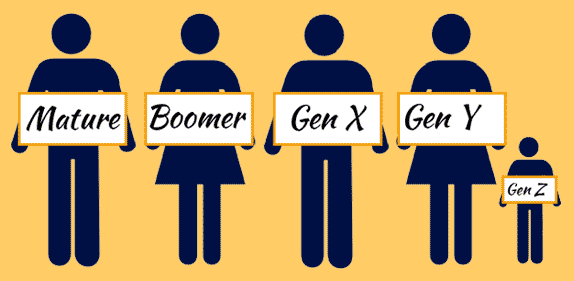How to market to consumers online when loyalty is difficult
 For years, all we heard about was Generation Y and how we needed to market to them. Of course, it’s been about a decade now and a new generation has emerged, Generation Z, and like every generation before them, they are harder to market to. Retailers, especially online retailers much approach them differently to how other generations have been approached.
For years, all we heard about was Generation Y and how we needed to market to them. Of course, it’s been about a decade now and a new generation has emerged, Generation Z, and like every generation before them, they are harder to market to. Retailers, especially online retailers much approach them differently to how other generations have been approached.
The difference between Generation Z and other generations that came before them is that Generation Z has greater access to mobile phones and the internet. That is the first problem.
With greater access to the internet and technology Generation Z has more choice at their disposal. If they don’t like the stock in one store, they can simply look online for another clothing store or electronics store. The possibilities are endless.
Increased choice also means that they can simply go to a new retailer if they don’t like what’s on offer.
Loyalty programs no longer work. There is so much choice available. Generation Z, despite their infatuation with social media, does not want to hand over their details to retailers to be mass marketed to. Traditional techniques don’t work. Basically, if it doesn’t make their life easier, or could complicate their life in any way then they don’t want to know about it.
Generation Z is heavily influenced by what their peers say. If a product has a bad review online then that is really hard for a retailer to come back from, even if they discount it to counteract the negative review. It poses a real challenge. Retailers, or any business for that matter, has always needed to work hard to maintain their customer base, however, when people can share their negative experience just as fast as it took place, retailers really need to work to keep their customers happy.
One bad review can undo months, or even years of hard work and this generation isn’t quick to forgive. Although they don’t place emphasis or value on loyalty, they do want to be able to trust their retailers. In an age when governments can’t be trusted that is even more important for Generation Z.
This behaviour has partially been shaped by the time in which they grew up. Unlike Generation Y, which grew up in a relatively good economic climate, Generation Z has grown up in a recession and it being much harder to obtain employment. These events mean they are less likely to part with their money than other generations. They want to know that what they’re buying is good value and that they will not end up worse off if they buy the product.
That could be through interactive promotions, similar to Pokemon Go! Many cafes, across the world, capitalised on the trend by offering Pokemon Hot Spots. They were seen as hip and cool and gained access to customers they otherwise wouldn’t have had access to. Retailers need to think outside the square and be quick to respond to and anticipate the next trend.
At the moment the Olympics are on, so it would be worthwhile for online retailers to offer promotions related to the Olympics. Businesses need to keep up to date with what is going on in the world otherwise they’re going to be left behind and will be perceived as not knowing what they’re doing. Generation Z is less forgiving of that type of behaviour than other generations.
The biggest difference for retailers is that unlike previous generations, Generation Z is the first who truly has the world at their fingertips. They can literally access every single product in the world at the tap of a phone and know the best price, the most popular trend. No other generation before them has grown up like this.
In a nutshell, if you want to appeal to Generation Z you need to:
1 – Follow current trends.
2 – Tell the truth and be honest.
3 – Ensure that you have positive reviews. That means you will need a web presence. Basically, if you don’t have an online presence you might as well not exist. If you can’t be Googled then how will people know you’re legitimate?
4 – Don’t bother with loyalty programs. Generation Z doesn’t have the patience for them. They want convenience rather than annoying cards and other monitoring material.
5 – Offer value for money.
If you follow these tips then you are sure to win the hearts of Generation Z and successfully sell to them online or in a physical store.
Different online shopping habits of various Generations
 Everyone approaches online shopping differently, but were you aware that every generation has a different behaviour when it comes to shopping? Some generations are thrifty and don’t like to spend much money, while others live in the moment saying YOLO (for those who don’t know, that means you only live once).
Everyone approaches online shopping differently, but were you aware that every generation has a different behaviour when it comes to shopping? Some generations are thrifty and don’t like to spend much money, while others live in the moment saying YOLO (for those who don’t know, that means you only live once).
As a result, marketers must cater for these different behaviours and with the world of online shopping that can be both trickier, and easier at the same time.
For starters, millennials and baby boomers are living in smaller spaces which means they don’t need as many items for their home as previous generations. They can get by with much fewer items for their home.
That said, there is another side to the story. Millennials are moving out of the home and must, therefore, buy furniture for their new apartment or house, most likely a house though if they live in a major city in Australia.
With the rise of fast fashion and cheap outlets like Zanui, people do not want to spend huge amounts on furniture and will often hunt around for the cheapest item they can find.
There is, however, an opportunity for retailers to capitalise on this and market their products towards these groups.
Baby boomers are willing to spend money in other areas.
According to research, they’re investing money into homewares and travel, so there are opportunities for online stores to promote these products to a greater extent than they presently are. That’s where the real opportunity lies.
Marketers need to take a different approach when dealing with millennials. Millennials have a much higher disposable income from other generations and as such, they have unsurpassed spending power.
With that though comes increased demand. Millennials know what they want and given they’ve all grown up with the technology they’re able to research the best deals online so they have all the facts in front of them prior to shopping.
Despite millennials wanting the best price around and despite the rise of fast fashion, they are loyal to their preferred brands when shopping.
Generation Z, the generation born after the mid-1990s, although like other generations there is no particular date, are less loyal to their brands. In fact, they don’t even have “their brands”. They are much more about price and will switch brands if they find cheaper elsewhere.
With increasing numbers of Generation Z consumers, marketers are faced with a real challenge. Once upon a time, it was possible to market to your consumers based on loyalty and relationships. Anyone in sales or who have known people who have sold products knows the importance of relationship building, and that you must develop a relationship with your consumers. That relationship can be performed in numerous ways, including through discounts for loyal customers, special products and rewards for loyalty etc.
As mentioned though, it’s harder to reach Generation Z this way so marketers must look to other ways.
When making purchasing decisions they consider online reviews and like to know what their peers are saying about brands or products. Despite them not being loyal to their brands, trust is a big factor that will influence their shopping habits. They are not fast to trust strangers and unsurprisingly they hate being lied to.
It has been well documented in the past that millennials do not like being tied down. While other generations liked the security and didn’t mind being locked into contracts, Millennials like to have the freedom to move around and shop for the best deal. That’s much harder to do if you’re locked into a two-year contract.
Millennials know all too well that they may miss out on a better deal if they are locked into a contract and that is why they avoid them. Millennials like to maintain freedom and the ability to choose.
That is why online shopping is fantastic, it allows consumers the choice and ability to conduct prior research before they buy a product. They can become fully informed without being locked in, and brands don’t lose out on possible consumers.
Comparison vs Daily Deal websites
 There are so many different types of websites online offering discounts and advice around the best possible online deal. With so many, it’s easy to get confused and not know the differences between what a daily deal and a comparison site are. Luckily for you, we’ve done the research and can take away the mystery for you.
There are so many different types of websites online offering discounts and advice around the best possible online deal. With so many, it’s easy to get confused and not know the differences between what a daily deal and a comparison site are. Luckily for you, we’ve done the research and can take away the mystery for you.
So what exactly is a daily deal website and how does it differ from a comparison site? Firstly, we must discuss what a daily deal website is.
A daily deal website is a website which offers daily deals. They offer daily deals based on agreements with retailers that are, as we’ve just explained, daily deals. They are limited offers. Generally speaking, daily deals will only last for up to a few weeks. Most commonly they will appear on the website for a few days at a time.
The main selling point of a daily deal is that they are a limited offer. They are only available for a short period of time to a select number of people and will not be extended.
There are many daily deal websites like Scoopon, Groupon and others. They specialise in restaurant, travel, health and fitness and other small goods that you would generally want a discount on.
The discount you get on daily deal websites can be anywhere from 10% right up to 50% and in some cases, it will be much higher. It comes down to the individual retailer who is offering the deal through the website.
Of course, what many people are not told up front is that a daily deal will normally have add-ons. That means that if your deal is for a drink and a meal at a restaurant it will only be up to a certain value and if you want to go above that value you will need to pay more.
The goal of daily deals is to get you in the door. Once you’re in the door it is easier to get your money and much easier to upsell to you. It’s like any sale. Getting the first part of the sale is always the hardest part but once you have crossed that threshold it is much easier to upsell to you. The key for businesses wanting to upsell is that their product must be good enough to entice the customer to spend more money.
Comparison sites are completely different from daily deal websites. The only similarities between the two is that they are websites and they are online. There is no other similarity.
A comparison website is designed so that people can compare various brands in a particular category. For example, comparison sites are popular across the following industries:
- Airlines
- Electricity
- Insurance
- Credit cards
A comparison site will take all the major brands and even some of the non-major brands that you wouldn’t think of when looking to change your insurance or credit card provider. They will then list the features of each product and you will be able to compare the different prices that are on offer.
Price isn’t all that is compared to a comparison website. They also analyse the features and benefits such as:
- What is the interest rate?
- What add-ons do I get?
- What rewards are available?
The comparison sites will analyse how the features and benefits stack up with the cost of the product.
Unlike product reviews which take a stance, comparison sites will review the products with impartiality and just lay out the facts for you without an opinion.
Comparison sites allow people to conveniently see what various brands are offering in one location and then make an informed decision on what product or service to purchase rather than just going with what seems like the best deal, but may not be.
Shopping at Ebay at the Lowest Prices
 In today’s economic climate people don’t have as much discretionary income as they might have in previous times. This is due to the rising cost of living. As a result, they want to be sure that they are not paying too much for goods and services. That leads to them making decisions to save money. One such decision means that they are searching online for cheaper prices and looking for the best discounts they can possibly get their hands on.
In today’s economic climate people don’t have as much discretionary income as they might have in previous times. This is due to the rising cost of living. As a result, they want to be sure that they are not paying too much for goods and services. That leads to them making decisions to save money. One such decision means that they are searching online for cheaper prices and looking for the best discounts they can possibly get their hands on.
Their online search is quite extensive and they will conduct research to find the best value for money. Value for money is not just defined by the lowest price. It is also defined by the number of features and the quality of the product that you are purchasing. People will look at goods on a number of sites. The sites they look at for the best deal around extends to Ebay as well as the major online retailers and discount chain stores.
Ebay allows shoppers access to many more products than what they could find in their local area. EBay has such a wide range of products that you can easily choose from without even leaving your house. All you need to do is go onto the website and enter a search term of the products that you want. Then you’re away and can easily find the products that you want.
Shopping through Ebay gives you access to products at prices you wouldn’t otherwise have access to. You can find products at a rate cheaper than what you would pay in store. When you buy online you have access to retailers that may not be in your particular town or city, so you’re not limited by geography or the cost of living where you are.
Often the reason why goods are cheaper online is that online retailers have lower overheads so they can charge less than what a local business would charge. The really good part about buying online is that the quality is just as good as what local brands would charge, but you do not pay local prices.
Sometimes people associated cheap with goods not being as high quality but that simply isn’t true. There have actually been reports that cheaper products are manufactured in the same factories as labelled ones and that in some cases the only difference is literally the label on the product. The product itself isn’t actually any different.
People are also busy today and don’t have the time to wait at stores. They want to get their shopping done easily. When you use online shopping websites that are done conveniently from your home and at any time you want. You don’t have to contend with crowds of people or worry about car parking. Online shopping allows you to be focused in your shop so you only target a specific product and don’t waste time.
When you shop online it is much easier to maintain focus and you won’t need to worry about getting distracted looking at products you don’t actually want or need. You will just search for the products you want. You can streamline your search so that you compare the different offerings available. Comparing prices and features is much easier online and you will not need to spend time travelling between stores That will not only save you money on the products that you’re buying. It will also save you the money you might have spent on others had you gone into a physical store.
Instead just sit back, browse products from the comfort of your own home and then wait for the discounted goods to arrive. It will be like Christmas for you all year round when you buy online.
What you should never pay full price for?
 These days it seems that everyone is looking for the lowest price and looking for a way to save a dollar or two. People don’t have a finite supply of money so they need to be sure they’re getting quality when they make a purchase and sure that they’re spending their money wisely. If you don’t spend your money wisely there can be consequences. One such consequence is that by trying to get a bargain you end up paying more in the long run, this is especially the case if you buy an item cheaply but you have to replace it more often and end up paying more than if you’d simply spent the full amount in the first place.
These days it seems that everyone is looking for the lowest price and looking for a way to save a dollar or two. People don’t have a finite supply of money so they need to be sure they’re getting quality when they make a purchase and sure that they’re spending their money wisely. If you don’t spend your money wisely there can be consequences. One such consequence is that by trying to get a bargain you end up paying more in the long run, this is especially the case if you buy an item cheaply but you have to replace it more often and end up paying more than if you’d simply spent the full amount in the first place.
So what should you spend and splurge on?
You should never splurge on magazines. Don’t pay the monthly or weekly cover charge. Instead get a subscription and save yourself some money. You can often save yourself a large portion of the cover charge. Shop around for the best deal as well. Just because the price is high at one place doesn’t mean it will be at another and let’s be honest, that money is better in your pocket than someone else’s.
Most people don’t buy their books in the store anymore and you shouldn’t either. When you pay full price you might as well be giving your money away. You shouldn’t pay full price for books because in all honesty, you’re only likely to read them once or twice before they’ll be sold on. So why not by them cheaply and sell them later anyway?
Clothes are another category you should never pay full price for. There are so many discounts available. You can either take advantage of two for one deal or simply wait until the end of the season and get the same item on sale for half the price. I know this is what I do. I never pay full price for my clothes, well that’s not strictly true. I do, but only when I really can’t wait for the item and it’s high quality. If the item is seasonal then you definitely should not be paying full price as you won’t get all the wear out of it that you need to. You can also utilise the specials you can get when you use coupons.
There are so many discount grocery stores around, both online and offline. The key is to buy in bulk. When you buy in bulk you get discounts that you wouldn’t get if you were to just buy one or two items at once. It’s best to buy in bulk, especially if you are buying an item you regularly buy, for example, don’t pay full price for bread, but make sure you can store it in a freezer or it will go off and you’ll lose the benefit of the discount. You don’t want to end up spending more money in the long run.
Appliances come in and out of fashion every couple of years. The reason for this is because technology is constantly evolving. As a result, you should never pay full price for electronic appliances because you could end up losing the money and having less in your pocket. This is especially the case for technology such as mobile phones. There is a new smash hit phone every couple of years. Speaking of smash hit phone, most people drop their iPhone or Android phone at least once and end up with a cracked screen. That can be pretty costly if you do it on a regular basis.
It can be really difficult to spot a bargain online but there are a few things you need to ask yourself and you’ll be able to.
If you ask yourself how long the item you’re purchasing will last you and then the number of times you will use it, or how long you expect it to last you can identify if it’s a bargain or not. The greater the use you get out of something, the more of a bargain it is if it was reasonably priced. Let’s be honest though. What we deem “reasonable” differs between us greatly. Some of us would think a $350 leather jacket is a bargain while others would think that’s a splurge. Some, on the other hand, would be happy paying $30 for a book but others would deem that a rip-off. It’s all about what you value and there is no set formula to what we place value on. There is, however, a formula to “cost per use” or “cost per wear”.
There are of course occasions when you should pay full price but again, that’s definitely up to the individual and what they value. If you are conscious of what you’re spending though then make the most of discounts and coupons. That way you’ll have more of your own money in your pocket rather than giving it to retailers and help them go on an expensive trip to Fiji.
